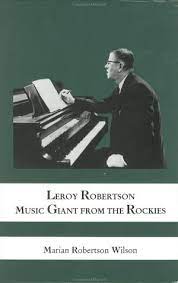Articles/Essays – Volume 30, No. 4
Fiddler with a Cause | Marian Robertson Wilson, Leroy Robertson: Music Giant from the Rockies
Leroy Robertson was one of my mentors. I played in the Brigham Young University orchestra under him in 1945-46, studied music theory from him as a graduate student at the University of Utah in 1955, and was appointed to the U of U music department as a faculty member during his chairmanship in 1960. I was inter viewed by the author shortly after she commenced work on her father’s biography and either performed in or conducted many performances of his works during my twenty-two-year tenure with the Utah Symphony.
Marian Robertson Wilson’s book is essential reading for those who would understand music in the American West during her father’s lifetime and since, for that matter. Her perspective as a devoted daughter is seasoned by her own professional competence as a language scholar and editor. The book is replete with detail, amply documented, and yet provides intimate access to Robertson’s private life—fortuitous for the reader since he granted glimpses of his personal life rather grudgingly.
The first section of the book dealing with his family background up to the time of his marriage reads like a classic rural Mormon family saga though presented in a graceful literary style. The author’s view is broad and authoritative, her treatment rich in detail, with her unequivocal devotion to her father evident on every page. The Robertson of the biography seems too much an individualist to be an arche typal Latter-day Saint, but his Mormon roots seemed to serve him well throughout his personal and professional life.
One doesn’t need Marian’s testimony to affirm his role as Utah’s leading resident composer of classical music. His eminence during his life time has not been seriously challenged, to my knowledge. The proof of the pudding is in the consumption. I continue to be nourished by the integrity, imagination, lyricism, and the impeccable musical craftsmanship of his works. I treasure a stereo recording of his Book of Mormon Oratorio, which was described by critics as “monumental, historic,” and “one of the musical masterpieces of the twentieth century,” recently reissued on CD by Vanguard Classics in Europe but not currently available in the USA. The author informed me recently that performance, publishing, and recording royalties worldwide continue at a consistent and ongoing rate. Western United States performances are sadly not keeping pace, which forces us to conclude that the adage that prophets are without honor in their own country applies to composers as well. In a time when support of symphony concerts seems to be on the wane, it would appear that better use could be made of this giant’s considerable output, particularly in his home state.
Robertson’s international acclaim began with his receiving the Henry H. Reichhold prize of $25,000 in 1947 in a competition open to all composers of the Western Hemisphere, perhaps the largest single award ever given to a composer up to that time. His acclaim as a composer is better known but not more important than his untiring work in creating the foundation for the culturally rich environment for which Utah has a deservedly national reputation. As a pioneer in the establishment of symphony orchestras in Utah which could give creditable performances of the great masterworks, he deserves our thanks and our praise. I have heard Maurice Abravanel speak his name with the highest regard hundreds of times both for his compositions and his work as a music educator. His pioneering effort to provide a home on the University of Utah campus for a major symphony orchestra (the Utah Symphony) became a model that has been emulated but not exceeded.
Thanks to this biography we are treated to a liberal amount of the Robertson wit and wisdom. However, one can never get the full impact without hearing his own droll voice intoning it. That I had the opportunity on a daily basis to enjoy it was a joy of my student days. In spite of notable successes, this biography is full of great and unrealized expectations. He is one of many composers of a high or der whose works have not achieved the level of familiarity they need and deserve. He dealt with disappointments philosophically in the spirit of a line penned in some class notes while he was a graduate student at USC, “Transitory trials are nothing to the life of the soul.”
The jury is still out when it comes to defining with any degree of satisfaction if there be such a thing as “Mormon” or even “American” music. If that issue is ever to be resolved, it must include taking Leroy Robertson’s output seriously. His branches reach out over the wall requiring that his output be measured against the finest composers our country has produced. This book generously fills a compelling need that we face our own history. Marian’s book reminds us both of what we have had and what we may have forgotten. It is a fitting way to have marked two singular centenary celebrations in 1996, the birthdays of the dean of Utah com posers and the State of Utah.
Leroy Robertson: Music Giant from the Rockies. By Marian Robertson Wilson (Salt Lake City: Blue Ribbon Publications, 1996).


 Back to full Issue
Back to full Issue

